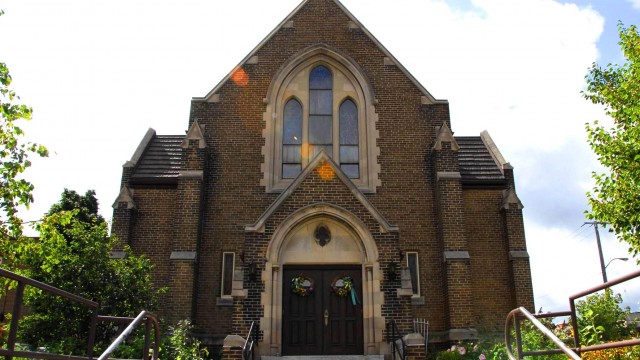In late November, the YW opened a 45-space winter overflow shelter at St Mark’s Lutheran Church in Kitchener. This is the third year, and the second consecutive year, that we’ve provided this emergency service, and each year we’re asked the same question: Why?
2014/2015
At the end of the winter of 2014, most of the churches that had participated in the community’s decade-old Out of the Cold program closed their doors for the last time. The popular program had been formed and run by volunteers, to provide a meal and overnight shelter to the many men and the handful of women who were unable to stay in the formal shelters because the shelters were full, or because they were restricted from using the formal shelters for a range of reasons. The program was intended to be a short-term one, but that wasn’t how it worked out. Many Out of the Cold guests came to prefer the informal system, with its welcoming atmosphere and few expectations, so even when the formal shelters had space, these guests chose the churches instead.
The different churches had different reasons for their eventual decisions to stop offering overnight accommodations, but most cited volunteer exhaustion as a primary one. Others said that they believed that the formal system, with its attached housing assistance and other professional supports, had more to offer the homeless men and women they served than the informal system did.
In 2014, the formal shelters had space, but the community feared that the Out of the Cold guests would struggle to make an abrupt transition between the two systems, so over the winter of 2014/2015, the YW ran the region’s ‘transitional shelter’. The intent of the transitional shelter was to provide ‘low barrier’ services that looked and felt as much like the Out of the Cold services as possible, while linking the service users to housing and to the formal shelter system. It was a successful project, and by the spring of 2015, only a dozen of the more than a hundred men and women it had served still lacked housing.
2015 – 2017
For the next two years, no winter overflow shelter was needed, as the formal shelters were able to accommodate almost everyone who needed service, with occasional emergency motel use. However in the fall of 2017, that changed. Numbers in the shelters skyrocketed, and as the opioid epidemic seized our community, so did the needs of the people the shelters served. Between January and April of 2018, the House of Friendship operated an overnight drop-in shelter at St. Matthew’s Lutheran Church in Kitchener, to manage what we all hoped was only a ‘temporary blip’ in the numbers of people who were homeless.
2018/2019
The temporary blip wasn’t. Over the course of the next year, the region’s shelters provided 107,340 ‘bed nights’ (an increase of 21% over the 88,511 bed nights in the previous year), and spent almost $1 million on motel bills. In November 2018, the YW once again turned our community room into a 45-bed winter overflow shelter, which ran until the end of April 2019. And again, we all hoped it would be the last time such a service would be needed. New housing assistance programs, which combined rent supplements with home-based supports, had been launched and were promising to reduce and even to end chronic homelessness in our region.
2019/2020
These housing assistance programs are in fact housing many people. But they’re struggling to stay ahead of the growing need. A study completed by The Working Centre was released in October of this year. The study surveyed 263 street-involved individuals living in and frequenting the downtown core of Kitchener. Among other things, the study concluded that there are 134 shelter beds in downtown Kitchener and approximately 136 homeless individuals who cannot use the shelters due to past service restrictions or due to shelters’ limited capacity.
The YW is very grateful to St Mark’s Lutheran Church, for allowing us to use their space for the next five months, and to several other churches that have come forward to provide sandwiches for the guests we will serve. The old Out of the Cold program may no longer exist, but the spirit in our faith communities of caring for our marginalized neighbours remains.
Written by; Elizabeth Clarke, CEO YW Kitchener Waterloo



